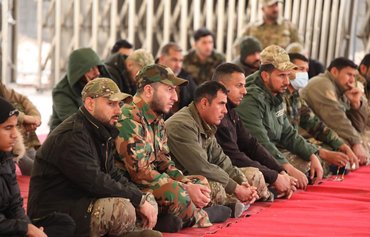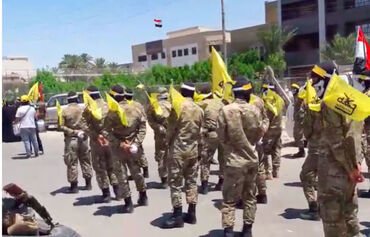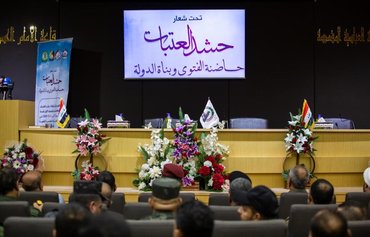The Iraqi government announced a series of steps to bring armed groups that supported Iraqi forces in fighting the "Islamic State of Iraq and Syria" (ISIS) under its control and to regulate their weapons.
These steps are key to ensure sustained stability after ISIS was ousted from Iraq, officials told Diyaruna.
The new decision would place the weapons of the Popular Mobilisation Forces (PMF) under the control of the government only to be used within legal constraints that govern all state institutions.
On December 15th, Prime Minister Haider al-Abbadi confirmed the government "has started to implement its weapons control strategy".
The Iraqi government is "committed to maintaining stability and societal peace as well as confronting the roots of terrorism and fighting corruption", he said in a statement.
"The government is working on bringing the PMF under a legal government framework," he said, adding that "having volunteers [PMF fighters] alongside the security forces is a fixed government policy".
In a December 9th speech, al-Abbadi underscored the importance of working over the next period towards "establishing the rule of law and preventing weapons ownership beyond the control of the state".
Government seeks to reinforce 'rule of law'
Arms control is a "sound decision", Iraqi MP Hamid al-Mutlaq, who serves on the parliamentary security and defence committee, told Diyaruna.
"We view this step favourably as it indicates full awareness of future [implications] and a desire to reinforce the rule of law in order to preserve the unity and stability of the country," he said.
"We support this decision and now want to start the chapter of reconstruction after folding the chapter of terrorism," said al-Mutlaq.
He suggested working on absorbing local fighters that supported the security forces in their war on terrorism into "regular forces" as a subsequent step.
"Qualified fighters would join the security forces and state institutions, while older and unqualified fighters would be given an honourable discharge and receive a pension," he said.
Additional troops needed
"The government wants to protect the rights of all the volunteers in appreciation of the services and sacrifices they made in the fight against ISIS," said Iraqi MP Majed al-Gharawi, who serves on the parliamentary security and defence committee.
Those volunteers need to be made "part of the security apparatus according to legal frameworks and under government supervision", he said.
"The ministries of defence and interior need additional troops that have actual combat experience in order to hold the liberated territory and protect the borders," he told Diyaruna.
Attacks from ISIS elements infiltrating Iraq through the Syrian border have not completely stopped, al-Gharawi said, adding that there are still ISIS pockets and incubators inside the country.
"This threat requires more troops and state of the art weapons and military technology, as well as more intensive training," he added.
Al-Gharawi cautioned against "taking advantage of the [PMF] forces participation in the war on terrorism for promotional purposes" as the elections, scheduled for May 2018, draw near.
'Demilitarising society'
After its victory over ISIS, the government now wants to bring all weapons under the state's control, said researcher Hisham al-Hashimi, who specialises in the study of extremist movements.
"The government is moving in the direction of demilitarising society and reassuring the Iraqi street and the rest of the world that it would ban militant groups and unlicensed weapons," he told Diyaruna.
The presence of such groups "undermines the strategy for stability and reconstruction", he said.
"Some of the bigger armed factions have recently announced that they have placed their weapons, particularly heavy weaponry, under the control and management of the security forces," al-Hashimi said.
Additionally, the government is in the process of organising the PMF, identifying their numbers and their geographical distribution, as well as their military camps and storage facilities, he said.

![Armoured vehicles and bulldozers of the Popular Mobilisation Forces advance through the town of Tal Afar, west of Mosul, after the Iraqi government announced the launch of the operation to retake it from the 'Islamic State of Iraq and Syria' on August 26th, 2017. [Ahmad al-Rubaye/AFP]](/cnmi_di/images/2017/12/27/10884-iraq-pmf-600_384.jpg)






